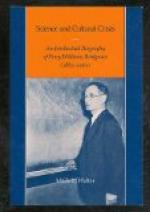|
This section contains 1,794 words (approx. 6 pages at 300 words per page) |

|
World of Physics on Percy Williams Bridgman
Percy Williams Bridgman was an experimental physicist whose principal focus was on developing apparatus for producing high pressures and on measuring the effects of high pressures on materials. His work in high-pressure physics won him the Nobel Prize in 1946. The results of his work continued to have implications for such diverse fields as solid-state physics, geophysics, and cosmology.
As an academic concerned with doing experiments rather than constructing theories, Bridgman made a number of discoveries that had profitable applications. His work on the electrical and thermal conductivity of metals became important to industrial metallurgists. The refrigeration industry was intrigued when Bridgman's high-pressure experiments produced "hot ice," a form of water that was solid at eighty degrees centigrade (the normal melting point of water is zero degrees centigrade). Hot ice turned out to be of no practical value, but other entrepreneurs speculated that a similar process might produce artificial...
|
This section contains 1,794 words (approx. 6 pages at 300 words per page) |

|


